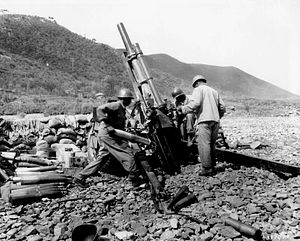The American diplomat and historian George F. Kennan is most remembered for authoring the “Long Telegram” from Moscow in February 1946, which examined the historical and ideological bases of Soviet foreign policy. It is one of the seminal documents of the early Cold War years, and it helped shape the U.S. doctrinal response to Soviet actions throughout much of the Cold War, known as “containment.”
Four years later on August 21, 1950, when Kennan was a counselor to the State Department, he wrote a less well-known and less influential paper about conditions in the Far East, which recommended specific policy approaches for that part of the world that could reasonably be described as “retrenchment.”
The genesis of the memo was a request by John Foster Dulles for Kennan to comment on the Department’s latest draft of the Japanese peace treaty. Dulles, who later became President Dwight Eisenhower’s secretary of state, was working on the treaty for the Truman Administration. Kennan, as he previously did with the Long Telegram from Moscow with regard to America’s policy toward Europe, used this opportunity to present his views on America’s broader Far East policy.
The paper was addressed to Secretary of State Dean Acheson, who had succeeded George Marshall in that post. Kennan began the paper by describing U.S. policy in the Far East as “little promising” and “fraught with danger.”
U.S. objectives in Korea, he wrote, were not clear or realistic and were based on “emotional, moralistic attitudes” which “unless corrected, can easily carry us toward real conflict with the Russians and inhibit us from making a realistic agreement about that area.” According to Kennan, the United States was right to enter the war, but “it is not essential to us to see an anti-Soviet Korean regime extended to all of Korea.” He even suggested that the United States could “tolerate for a certain period of time a Korea nominally independent but amenable to Soviet influence.”
“It is beyond our capabilities,” Kennan explained, “to keep Korea permanently out of the Soviet orbit.” He continued: “A period of Russian domination, while undesirable, is preferable to continued U.S. involvement in that unhappy area.” U.S. interests would be better served, he continued, if Japan instead of Russia eventually dominated Korea.
Kennan urged the secretary to reign in General Douglas MacArthur, who, he wrote, had “wide and relatively uncontrolled latitude… in determining our policy in the north Asian and western Pacific areas.” Kennan had previously met with MacArthur in Japan and came away unimpressed with the general’s overall approach to Japan and the Far East.
The current U.S. approach to the “rival Chinese regimes” (the People’s Republic on the mainland and the Nationalists on Taiwan), Kennan wrote, is likely to cause difficulties with other countries in the region and some of our European allies. It would also “strengthen Peiping [Beijing]-Moscow solidarity rather than weaken it,” he warned. The United States, he advised, should not prevent the PRC’s admission to the United Nations.
Kennan also advised that the United States should not support France in Indochina. The French position there, he opined, was “hopeless.” The French should withdraw from Indochina, he wrote, “even at the probable cost of an eventual deal between Viet-Nam and Viet-Minh, and the spreading over the whole country of Viet-Minh authority.” It was a conflict, he explained, “which neither they nor we, nor both of us together, can win.”
The “most important single factor in Asia,” Kennan wrote, was Japan. Yet even here Kennan recommended U.S. military retrenchment. The United States, he wrote, should withdraw its forces from that country and negotiate with the Russians to neutralize and demilitarize Japan, while simultaneously agreeing with Russia to end the war in Korea and turning Korea over to UN control.
Kennan wrote this paper as he was leaving his position in the State Department. Since the Long Telegram from Moscow and his leadership of the Policy Planning Staff, Kennan’s influence had waned. He had publicly decried what he called the “militarization” of the containment policy he recommended in 1946 and 1947. He had opposed the formation of NATO and the development of the hydrogen bomb. His advocacy of “retrenchment” in the Far East, therefore, was consistent with the evolution of his strategic thought.
While some of Kennan’s recommendations in his Far East paper were insightful and prescient, especially regarding the eventual outcome for France and the United States in Indochina, had his policy approaches been followed generally, Japan, Taiwan, and South Korea may not have developed into free and economically thriving democracies.
Kennan’s paper can be read in full here.
Francis P. Sempa is the author of Geopolitics: From the Cold War to the 21st Century and America’s Global Role: Essays and Reviews on National Security, Geopolitics and War. His writings appear in The Diplomat, Joint Force Quarterly, the University Bookman and other publications. He is an attorney, an adjunct professor of political science at Wilkes University, and a contributing editor to American Diplomacy.

































